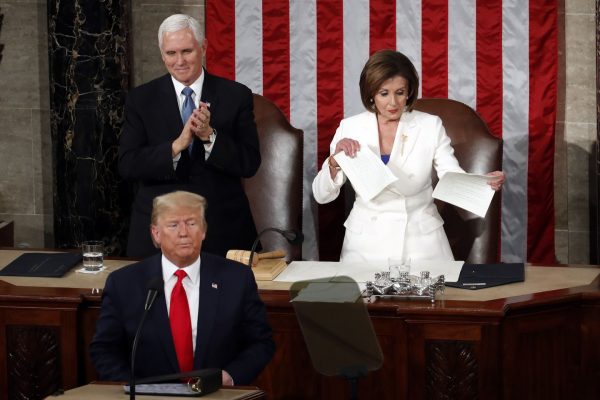Democracy and despotism in a digital age.
The State of the Union: Our Respondents React

Updated in real time.
Andrea Yang
Arizona Senator Kyrsten Sinema doesn’t always understand how bad thigh-high boots look on the floors of Congress, but, unlike her fellow Democrats, she understands just how bad petulance looks. While President Trump delivered a riveting SOTU address last night, most of the evil party’s ethno-fetishist and gender-narcissist sweethearts played on their phones, gossiped with their girlfriends, and jeered. Sinema stood and celebrated, alone, for each moment in which the President celebrated American greatness. She mirrored his warmth!
Trump’s tone was hopeful, inspiring, and emotionally engaging. Precisely for these reasons, Trump effectively baited the Democrats into looking as anti-humanity as they really are. Perhaps these ivory-clad empowered females™ believe the reasons for their flagrant resentment are clear and justified in the viewer’s eyes. But no! To normal people, when a once premature baby is presented as a healthy toddler, by her joyfully teary-eyed mother, as an example of the triumph of faith and science, those who fail to pay proper respect look plain cold-hearted.
To normal people, having lost dear friends to deaths of despair, those who mock or disregard success against the opioid crisis seem unusually spiteful. Normal people want to celebrate low unemployment. Normal people cry when soldiers come home, and especially when they don’t. Normal people demand the basic justice of imprisoning murderers. Ultimately, to normal people, Democrats who weren’t Kyrsten Sinema tonight looked bitter, snarky, and frigid. Nancy’s final tantrum was the cherry on top. I’ve seen similar behavior on this season of The Bachelor. PSA, ladies: frigidity is repulsive.
Andrea Yang is a writer in Washington, D.C.
Hadley Arkes
The State of the Union. From several angles it has to be reckoned a knock-out performance. That presentation by the President has to leave Republicans, and supporters of this Administration, in a buoyant state, and impart momentum to his campaign for a second term. I must confess that I’m still quite uncomfortable with presentations that use people in the galleries as props and resemble, at times, a game show: the mother from Philadelphia is given the scholarship for her daughter; the military mother is suddenly presented with her husband, returned tonight from his deployment abroad. Still, nothing could ever surpass the dramatic force of the last survivor of the Tuskegee airmen, 100 years old, with his grandson, made a Brigadier General that day. I was at the edge of tears, and nothing could have been grander.
But what mystifies me is Trump’s handling of abortion. He could have subjected the Democrats to the deepest embarrassment by pointing out that they have now voted massively in the House on two occasions against the bill to punish the surgeons who kill the children surviving abortions. The Democrats now stand for a right to abortion that extends beyond the pregnancy, a position that would shock most of the country if anyone in the media—or the President—would take the trouble to make it known. Instead he asks Congress to bar abortions late in pregnancy. Even the Republicans are not clear on the authority of Congress to pass that kind of legislation. But the House has twice passed the Born-Alive Survivors of Abortion Protection Bill, and could pass it again, just as it passed the original Born-Alive Survivors of Abortion Act 18 years ago. Why wouldn’t Trump challenge them to pass a bill they have the power to enact—and at the same time expose the Democrats to their deepest embarrassment? My surmise: He still doesn’t grasp this issue and the extraordinary lever that is within his reach.
Hadley Arkes is Founder and Director of The James Wilson Institute on Natural Rights and the American Founding.
W.B. Allen
Donald Trump will not be outbid!
This SOTU was almost unparalleled in the extent to which it centered the message on retail delivery of political promises in contrast to social transformation. In effect, Donald Trump’s retort to vague promises to transform America was the simple reply that “we the people do not need to be transformed, but we only need to be served.” That this message was greeted by a 49% job approval rating on the eve before an impeachment vote announces truly dire circumstances for Trump’s adversaries both within his party but especially for the Democrat Party. To be sure, Trump paid due heed to reaffirming national strength in national security and national economic policy. And he was relentless in pressing border security and affirming the sanctity of life. But the substance, the heart of this message, was a firm determination to press a domestic agenda that would fence out almost any opposition proposals. In short, Donald Trump is on the cusp of demonstrating “the art of the political deal.”
W.B. Allen is a Visiting Scholar in Conservative Thought and Policy at the University of Colorado Boulder for 2018-19. He is emeritus dean and professor at Michigan State University and member of the Board of Directors of the Ryan Foundation.
Jeremy Carl
What struck me most about Trump’s speech was the genuine air of confidence he projected. The President often comes across as bombastic or defiant in the face of a siege by enemies real and (sometimes) imagined. At the SOTU, he looked like someone who had just hit a record high for his Presidency in the Gallup poll while watching all of his prospective challengers implode in a laughable mess in the Iowa Caucuses. This was more the calm confidence of someone who truly expected to win—he didn’t even mention impeachment—and its mirror image was a petty, vindictive Nancy Pelosi theatrically ripping up the copy of the speech afterwards.
There were notable ideological feints to both the right and center. In the wake of Trump’s Super Bowl ad about criminal justice reform (not a favorite issue for the base, with good reason, imho), he pushed similar themes in SOTU. His focus on “inclusive” prosperity and use of the election-ready phrase “blue collar boom” spoke to a coherent election strategy, as did his repeated emphasis on benefits for African-American voters and those without high school degrees.
His claim that NAFTA was the biggest reason he ran for President was revealing. For someone accused of lacking ideological moorings, he’s been very consistent on trade over the years, and With USMCA being passed on a bipartisan basis, he’ll have a win here.
Conservatives will be delighted with his focus on illegal alien crime, free healthcare for illegals, and the insanity of sanctuary cities—but the media misses that these are actually great issues to draw in independents as well—not just ones to fire up the base. Conservatives should hope to see both more talk, and more importantly, more action, on these fronts in the run-up to the 2020 election.
Jeremy Carl is a Senior Fellow at the Claremont Institute. On a two-year journey around the world with his family, until recently he was based in Spain. He is now in Africa.
Josh Hammer
“[T]he essential battle is the meta-battle of framing the narrative,” Senator Ted Cruz (R-TX) told the New Yorker’s Jeffrey Toobin in June 2014. “As Sun Tzu said, every battle is won before it’s fought. It’s won by choosing the terrain on which it will be fought.”
During his State of the Union Address last night, President Trump successfully framed the narrative for the stark choice facing the American electorate this November. He lauded the revving American economic engine, which has inspired higher optimism among Americans about their economic future than has been seen in decades. He excoriated the scourge of sanctuary jurisdictions, which mollycoddle criminal aliens across the nation in brazen defiance of federal law. He appealed to Americans’ innate patriotism by recalling the just and proper killings of arch-terrorists Abu Bakr al-Baghdadi and Qassem Soleimani. By placing Democrats on the defensive with respect to their socialism, lawlessness, and capitulatory foreign policy agenda, Trump used his bully pulpit to choose the terrain on which the 2020 election will be fought. He made masterful use of the audience guests to drive home his substantive points. State of the Union Addresses are rarely remembered, let alone cited, for long — but by any account, this was an effective speech.
Josh Hammer is Editor-at-Large of The Daily Wire and Of Counsel at First Liberty Institute. He was a 2018 Claremont Institute John Marshall Fellow.
The American Mind presents a range of perspectives. Views are writers’ own and do not necessarily represent those of The Claremont Institute.
The American Mind is a publication of the Claremont Institute, a non-profit 501(c)(3) organization, dedicated to restoring the principles of the American Founding to their rightful, preeminent authority in our national life. Interested in supporting our work? Gifts to the Claremont Institute are tax-deductible.
In 2010, Claremont Institute Senior Fellow Angelo Codevilla reintroduced the notion of "the ruling class" back into American popular discourse. In 2017, he described contemporary American politics as a "cold civil war." Now he applies the "logic of revolution" to our current political scene.
Claremont Institute Senior Fellow John Marini is one of the few experts on American Government who understood the rise of Trump from the beginning of the 2016 election cycle. Now he looks to the fundamental question that Trump's presidency raises: is the legitimacy of our political system based on the authority of the American people and the American nation-state, or the authority of experts and their technical knowledge in the service of "progress"?




